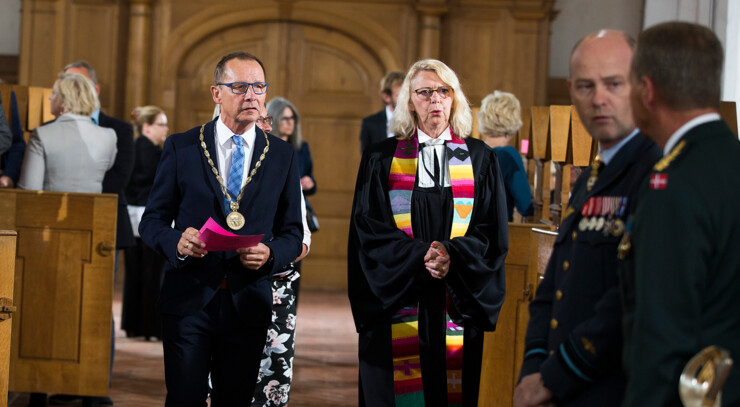Debate about upcoming law on translation of sermons
A proposal from the Danish government about translation of religious sermons to danish has gained criticism from pastors, bishops and lawyers

The proposed law will have a negative impact on, e.g. the German-speaking minority in Denmark. Photo of Mayor H. P. Geil and from the border region. "It is absurd to be under surveillance when you are preaching, no matter what language you are speaking," says Christa Hansen, a German-speaking pastor in the border region of Southern Denmark. In the picture she is walking next to the mayor of Haderslev, H. P. Geil. Photo credit: Diocese of Haderslev/Lene Esthave.
The Danish government is promoting a new immigration policy that it likes to call ”Fair and realistic” according to its own immigration policy paper. One particular proposal is quite controversial and affects non-Danish speaking churches and religious minorities at large: The proposal is that all religious communities in Denmark should have their sermons and religious speeches translated into Danish in writing and uploaded to its webpage
According to minister of Immigration and Integration Mathias Tesfaye the purpose is to prevent the dispersion of anti-democratic preaching, especially in Danish mosques. The proposal comes after revelations in the media of anti-Semitic statements from imams as well as imams participating in controversial sharia divorces.
The proposal, however, would not only target mosques, but also Greenlandic, Faroese, German churches in the southern part of Denmark, and migrant-congregations from around the world would have to translate their sermons. For many this could become a heavy and expensive administrative burden.
The legislative proposal has not yet been put forward, but is has already gained criticism and concern from lawyers, pastors and bishops. Several bishops and pastors with an immigrant background have criticised the proposition and The Council on International Relations has sent an open letter to the Prime Minister Mette Frederiksen and minister of ecclesiastical affairs Joy Mogensen, urging to drop the proposal, citing concerns for the Danish tradition of freedom of religion.
Several international ecumenical organizations and churches from other countries have sent letters of concern to the government, including Lutheran World Federation, Conference of European Churches, COMECE, the Evangelical Lutheran Church in Germany, the Anglican Church and many more. They all cite concerns for the general freedom of religion and belief and the cloud of suspicion cast on churches and religious communities who preach a different language than Danish.


